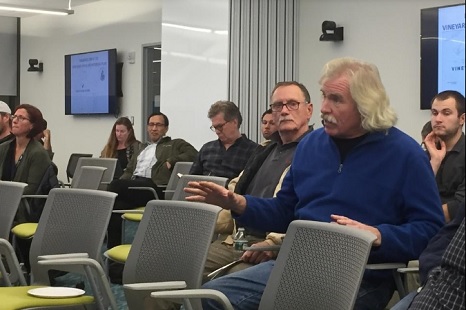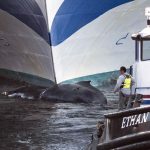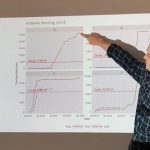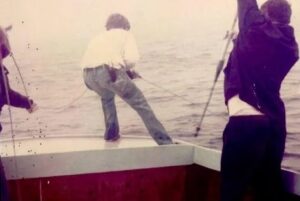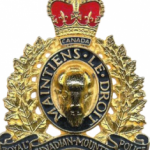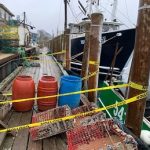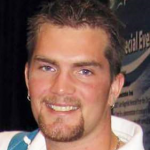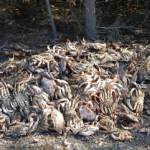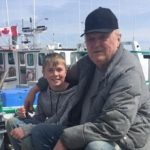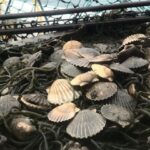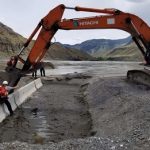Tag Archives: UMass Dartmouth
SMAST’s Kevin Stokesbury: On scallops, community collaboration, and a lifelong love of the ocean
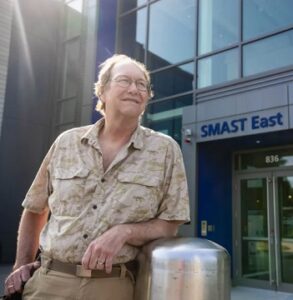 Growing up on the Bay of Fundy in Nova Scotia, Kevin Stokesbury spent as much time as possible swimming, searching for sand shrimp, and soaking up the sun with his siblings. Now as dean of the School for Marine Science and Technology (SMAST) at UMass Dartmouth, he’s finding practical applications for his passion with the sea. Stokesbury has played an integral role in revitalizing the scallop industry in New Bedford, inventing a drop camera in 1999 that snapped photos of scallops living on the seafloor, giving scientists and fishermen much more precise estimates of scallop numbers than previously available. The location map and information accompanying the photographs have proved vital. Stokesbury’s invention has greatly boosted the local economy. Before the drop camera, scallop boats brought in an annual harvest valued around $89 million. In 2021, it was $670 million, according to a NOAA commercial landings report. Video, Photos, >click to read< 17:41
Growing up on the Bay of Fundy in Nova Scotia, Kevin Stokesbury spent as much time as possible swimming, searching for sand shrimp, and soaking up the sun with his siblings. Now as dean of the School for Marine Science and Technology (SMAST) at UMass Dartmouth, he’s finding practical applications for his passion with the sea. Stokesbury has played an integral role in revitalizing the scallop industry in New Bedford, inventing a drop camera in 1999 that snapped photos of scallops living on the seafloor, giving scientists and fishermen much more precise estimates of scallop numbers than previously available. The location map and information accompanying the photographs have proved vital. Stokesbury’s invention has greatly boosted the local economy. Before the drop camera, scallop boats brought in an annual harvest valued around $89 million. In 2021, it was $670 million, according to a NOAA commercial landings report. Video, Photos, >click to read< 17:41
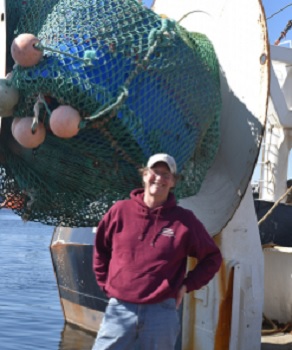
New England’s founding fish, may be returning to local waters
Atlantic cod, once a mainstay of the region’s economy, is being fished at historically low levels, but a research scientist whose past findings opened up a tightly regulated scallop fishery says cod may be staging a comeback. Before he heads out to sea, commercial fisherman Raymond Lees stops by Reidar’s Trawl Gear & Marine Supply in New Bedford to buy custom-designed fishing nets. The shape of the net, the width of its mouth and the size of its holes all help him target certain species of fish and, perhaps more importantly, avoid others. “I’ve spent so long running away from codfish that I’ve gotten better at running away from codfish,” Lees said during a recent run to Reidar’s. “I have specialized gear and I’m good at what I do.” “We went from a huge fishing business, as far as the groundfishing fleet’s concerned, of 300 boats down to 20 boats,” Bendiksen said. “It’s pretty much a 90 percent loss of what the fleet was.” >click to read< 08:10
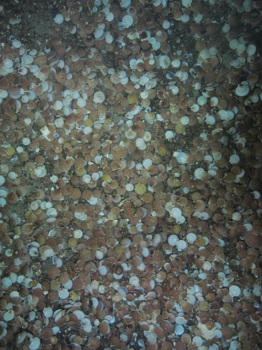
Stokesbury’s image-based, drop camera survey has been pivotal in the revival of the scallop industry
Stock assessment is one of the many key areas of research being conducted by several professors at UMass Dartmouth’s School for Marine Science & Technology (SMAST). Efforts led by Professors Steve Cadrin, Pingguo He, and Kevin Stokesbury help characterize how offshore wind development interacts with the marine environment, including important fisheries and critical habitat. Their findings are also critical in advancing offshore wind in a sustainable manner while minimizing impacts to existing marine activities and resources. >click to read< 13:34
Many fishermen believe Stokesbury saved the scallop industry
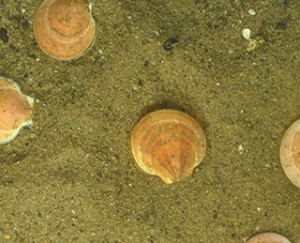 Well, I guess that I had better start writing some of this stuff down, as it seems that my memory is getting fuzzier by the day. Not an uncommon affliction for an old fisherman, who has been put ashore, but who still has enough recall to remember some things that are just too important to allow to fade into obscurity! I had been a scalloper out of New Bedford for 32 years, both as a deckhand, and as a captain of several high-line scalloper vessels. Over all those years there were several trips that stay relatively fresh in my mind’s eye, but one of the most important and fulfilling ones actually occurred after I came ashore. By Jim Kendall click here to read the story 21:55
Well, I guess that I had better start writing some of this stuff down, as it seems that my memory is getting fuzzier by the day. Not an uncommon affliction for an old fisherman, who has been put ashore, but who still has enough recall to remember some things that are just too important to allow to fade into obscurity! I had been a scalloper out of New Bedford for 32 years, both as a deckhand, and as a captain of several high-line scalloper vessels. Over all those years there were several trips that stay relatively fresh in my mind’s eye, but one of the most important and fulfilling ones actually occurred after I came ashore. By Jim Kendall click here to read the story 21:55
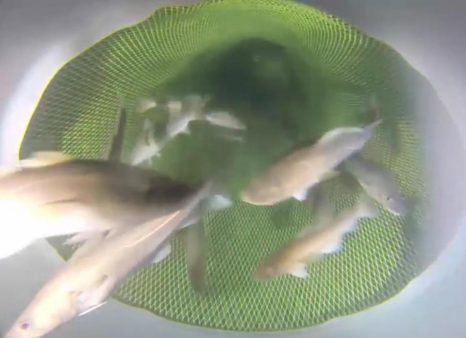
New SMAST camera can help assess cod stocks in Gulf of Maine
Researchers from UMass Dartmouth say they have successfully tested an underwater video-survey system that they hope will provide an accurate method to assess Atlantic cod stocks. In collaboration with fishermen, the research team recently placed high-resolution cameras in an open-ended commercial trawl net on Stellwagen Bank in the Gulf of Maine, known as one of the world’s most active marine sanctuaries. The cameras captured images of cod and other groundfish as they passed through the net. Periodically, researchers from UMD’s School for Marine Science & Technology closed the net for short periods to collect length, weight, and take other biological samples from some of the fish. The fish are unharmed and are returned to the sea. The system is design to be portable, so scientists can set it up on different fishing vessels. Professor Kevin Stokesbury, head researcher on the project, said the video system is an important tool at a time of uncertainty about the groundfish stock in the Gulf of Maine. Read the story here 17:57 Read the press release and watch the video here
Discard Mortality: What happens when a fisherman tosses a fish back overboard? It’s not a frivolous question.
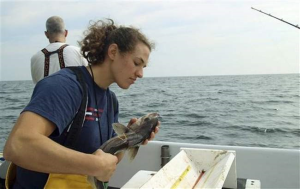 What happens when a fisherman tosses a fish back overboard? It’s not a frivolous question. The government bases catch quotas and other rules in part on the mortality of tossed fish, and there isn’t always accurate data available about how many fish survive the fling. Now, a group of New England scientists says it’s finding that a surprisingly high percentage of the lucky fish might live to swim another day. Read the article here 08:44
What happens when a fisherman tosses a fish back overboard? It’s not a frivolous question. The government bases catch quotas and other rules in part on the mortality of tossed fish, and there isn’t always accurate data available about how many fish survive the fling. Now, a group of New England scientists says it’s finding that a surprisingly high percentage of the lucky fish might live to swim another day. Read the article here 08:44
Saltonstall-Kennedy Grant Program – 900K for UMass Dartmouth fisheries research
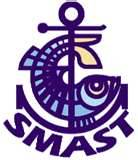 The National Oceanic and Atmospheric Administration has recommended a dozen Massachusetts-based marine research programs receive funding this year including more than $900,000 for UMass Dartmouth to conduct four projects whose aim is to improve the cost-effectiveness and capacity of programs to observe fish. Other Massachusetts research projects recommended for funding include: $497,060 for the Coonamessett Farm Foundation, $774,640 for four New England Aquarium Read the rest here 19:35
The National Oceanic and Atmospheric Administration has recommended a dozen Massachusetts-based marine research programs receive funding this year including more than $900,000 for UMass Dartmouth to conduct four projects whose aim is to improve the cost-effectiveness and capacity of programs to observe fish. Other Massachusetts research projects recommended for funding include: $497,060 for the Coonamessett Farm Foundation, $774,640 for four New England Aquarium Read the rest here 19:35
NOAA out of touch with scallop grounds, Fred Crabtree, New Bedford
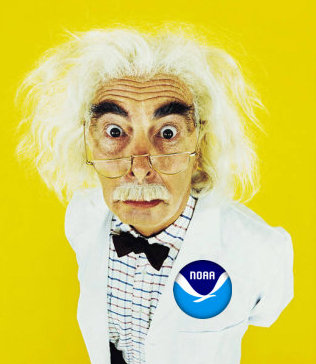 NOAA is proposing more regulations on the scallop industry, to justify its existence (“Council expected to vote on scallop grounds,” April 23). The National Oceanic and Atmospheric Administration has regulated the finfish industry to almost non-existence. The draggers that are still fishing have to buy fishing time from the draggers that stay tied to the dock. The scallop fishery would also be in the same shape were it not for UMass Dartmouth. Read the rest here 08:25
NOAA is proposing more regulations on the scallop industry, to justify its existence (“Council expected to vote on scallop grounds,” April 23). The National Oceanic and Atmospheric Administration has regulated the finfish industry to almost non-existence. The draggers that are still fishing have to buy fishing time from the draggers that stay tied to the dock. The scallop fishery would also be in the same shape were it not for UMass Dartmouth. Read the rest here 08:25
Money Well Spent! $450,0000 in State Funding of Cooperative Fisheries Research at UMass Dartmouth
 “UMass Dartmouth is fully committed to research that strengthens the scientific basis for fisheries management. Such research advanced the University’s mission to be an anchor of social and economic development for the region.” <Read more here> 08:03 Flow through fish survey video 2010 SMAST Video Survey
“UMass Dartmouth is fully committed to research that strengthens the scientific basis for fisheries management. Such research advanced the University’s mission to be an anchor of social and economic development for the region.” <Read more here> 08:03 Flow through fish survey video 2010 SMAST Video Survey
UMass Dartmouth plays integral part in booming scallop business
 Our beloved scallop, the biggest and best in the world, is right off our coast, waiting to make our lives better. The scallop — or placopecten magellanicus — keeps New Bedford the most profitable fishing port in the United States. Those riches wash all over southeastern Massachusetts. Scallops grow on the sandy bottom of Georges Bank, a rise in the sea floor that runs from Maine to New Jersey. The bank starts 20 miles offshore and runs 200 miles out in the ocean. There was a moratorium on fishing for several species, including scallops, after stocks plummeted on Georges Bank in the late 1990s. By 2000, fishermen believed scallops had made a comeback, so they enlisted UMass Dartmouth for help. READ more@heraldnews.com 02:13
Our beloved scallop, the biggest and best in the world, is right off our coast, waiting to make our lives better. The scallop — or placopecten magellanicus — keeps New Bedford the most profitable fishing port in the United States. Those riches wash all over southeastern Massachusetts. Scallops grow on the sandy bottom of Georges Bank, a rise in the sea floor that runs from Maine to New Jersey. The bank starts 20 miles offshore and runs 200 miles out in the ocean. There was a moratorium on fishing for several species, including scallops, after stocks plummeted on Georges Bank in the late 1990s. By 2000, fishermen believed scallops had made a comeback, so they enlisted UMass Dartmouth for help. READ more@heraldnews.com 02:13
Experimental Gear – Another try at video-counting the fish – Video
The black hull of owner Danny Eilertsen’s![]() F/V Justice emerged in the distance on Tuesday as a half dozen marine researchers from UMass Dartmouth waited on Union Wharf in Fairhaven. Eilertsen’s boat is playing host to the second round of testing of a radically different method of counting fish, a notoriously difficult thing to do, but the thing that everybody says they want and need. Among those climbing aboard was Dr. Kevin Stokesbury, more@sct
F/V Justice emerged in the distance on Tuesday as a half dozen marine researchers from UMass Dartmouth waited on Union Wharf in Fairhaven. Eilertsen’s boat is playing host to the second round of testing of a radically different method of counting fish, a notoriously difficult thing to do, but the thing that everybody says they want and need. Among those climbing aboard was Dr. Kevin Stokesbury, more@sct
Placopecten’s New Rules Stir Up Economic Storm for Fishermen
 the resident – After filling up the gas tank and picking up a pound of fresh Placopecten magellanicus, or New England sea scallops, for dinner, a little light went off in my head—oh no, the kid’s college tuition for next semester is on the to-do list. Wow, it’s hard to believe that what I shelled out for fuel and food can lead to that connection! The cost becomes clear when you talk to the local fishermen in the supply line, though, continued
the resident – After filling up the gas tank and picking up a pound of fresh Placopecten magellanicus, or New England sea scallops, for dinner, a little light went off in my head—oh no, the kid’s college tuition for next semester is on the to-do list. Wow, it’s hard to believe that what I shelled out for fuel and food can lead to that connection! The cost becomes clear when you talk to the local fishermen in the supply line, though, continued
HARVEY B. MICKELSON – UMass administration owes everyone answers on SMAST, the answers to the questions put forth herein must be forthcoming.
Apparently the administration of UMass Dartmouth is not going to respond to my request of having a public dialogue on its future relationship with the fishing industry. Those of us who have engaged in the seafood industry and who lived  through the pre-SMAST years and have an understanding of the impact of SMAST on the domestic fishing industry are entitled to answers. Read more
through the pre-SMAST years and have an understanding of the impact of SMAST on the domestic fishing industry are entitled to answers. Read more

Iconic fisheries scientist loses key UMass post – Richard Gaines gdt
The decision to remove Rothschild from the co-directorship of the institute he helped found 10 years ago was signaled in a press release dated Dec. 11. It featured the announcement of a decision to suspend the operations of a neurotoxin lab; only secondarily did the release describe a restructuring of the Marine Fisheries Institute and then never mentioned Rothschild by name, but noted that Steve Lorhenz, dean of the School or Marine Science and Technology at the University of Massachusetts Dartmouth, had become co-director of the institute. The decision to remove Rothschild from the institute was made by Marcie Williams, the vice president for academic affairs, based on a review of MFI by Associate Vice President Robert Gamache, and was “agreed to” by Divina Grossman, chancellor of UMass-Dartmouth, John Hoey, Grossman’s chief of staff, explained in a telephone interview. Read More
Recognition abounds for UMass professor Brian Rothschild By DON CUDDY – HEAR! HEAR!
NEW BEDFORD — Accolades are piling up for UMass Dartmouth professor and renowned marine scientist Brian Rothschild. This month, National Fisherman magazine announced it was giving Rothschild, 78, its Highliner Achievement Award for a lifetime of service to the fishing industry. Rothschild is one of four honorees from around the nation to be recognized the by the magazine of record for the commercial fishing industry. “These are the people who bring hope to their fishing communities,” National Fisherman editor Jessica Hathaway wrote in the November issue. “Their work sheds light on the way things can and should be done in the fishing industry.”
The announcement from National Fisherman comes at the same time that New Bedford’s Prince Henry Society selected the professor for its Man of the Year award, presented to an individual whose work has benefited the Portuguese community. Many of boats in the New Bedford fleet are owned and crewed by Portuguese fishermen. At UMass Dartmouth’s School of Marine Science and Technology, Rothschild and Dr. Kevin Stokesbury developed an innovative video survey for counting sea scallops in 1996 that is credited with preventing the collapse of what has become the most valuable fishery in the U.S. Rothschild was the founding dean of SMAST in 1995 and is known around the world for his work in population dynamics, biological oceanography and fisheries management. He has worked in fishery science for more than 50 years and has published nearly 100 peer-reviewed scientific papers and reports.
The Prince Henry Society presented the award during the Society’s annual banquet at White’s of Westport on Saturday evening. Later this month, Rothschild flies to China at the invitation of the Shanghai Ocean University, where he will be the featured speaker at an event celebrating the university’s centennial year.
“To be honored by my Chinese colleagues in ocean science, my friends in the fishing industry, and my friends and neighbors in greater New Bedford is a tribute that I share with all of my friends and colleagues who have sharpened my commitment to discovery and public service,” Rothschild said in a university press release.
http://www.southcoasttoday.com/apps/pbcs.dll/article?AID=/20121022/NEWS/210220315/1018/OPINION






 In a presentation at UMass Dartmouth’s School of Marine Science and Technology last week, Jonathan Grabowski said management decisions for the cod fishery have been based on trawl surveys to estimate fish populations, plus economic and environmental factors. Yet federal and regional fisheries management officials have not as readily included the social impacts of their decisions on fishermen and their communities. Fishermen have experienced high levels of stress and social disruption as the cod industry has declined due to overfishing and ineffective conservation measures. Meanwhile, their distrust in regulators has increased, he said. Using more social and experiential data from these fishermen could allow regulators to make better management decisions, Grabowski said. That could help the fishery function better, improve outcomes for the industry, conserve environmental resources, and rebuild trust.
In a presentation at UMass Dartmouth’s School of Marine Science and Technology last week, Jonathan Grabowski said management decisions for the cod fishery have been based on trawl surveys to estimate fish populations, plus economic and environmental factors. Yet federal and regional fisheries management officials have not as readily included the social impacts of their decisions on fishermen and their communities. Fishermen have experienced high levels of stress and social disruption as the cod industry has declined due to overfishing and ineffective conservation measures. Meanwhile, their distrust in regulators has increased, he said. Using more social and experiential data from these fishermen could allow regulators to make better management decisions, Grabowski said. That could help the fishery function better, improve outcomes for the industry, conserve environmental resources, and rebuild trust. 